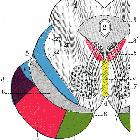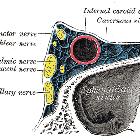möbius syndrome
Möbius syndrome, also known as congenital facial diplegia syndrome, is a rare congenital condition characterized by the absence or underdevelopment of the nuclei of the abducens (CN VI) and facial nerve (CN VII).
Epidemiology
Möbius syndrome is rare with an estimated incidence of ~1 case per 100,000 births .
Clinical presentation
The earliest sign is the inability of the newborn to suckle, with an expressionless face, and drooling. Paralysis may be unilateral or bilateral.
As individuals grow older, most conspicuous signs are an inability to close their mouths or smile. Inability to blink may lead to corneal abrasions.
Pathology
Etiology is multifactorial, and several theories have been proposed, with the most supported theory being of a transient ischemic or hypoxic insult to the fetus. Infectious and genetic etiologies have also been proposed.
Additional brainstem involvement is also common and may include other cranial nerves as well as the musculoskeletal system. Grading schemes have been proposed which include additional manifestations (e.g. CLUFT (cranial nerve, lower limb, upper limb, face, and thorax)).
Associations
The combination of Möbius syndrome and Poland syndrome has been well described (thus Poland-Möbius syndrome) .
Radiographic features
MRI brain
MRI findings are those of brainstem hypoplasia (pons and medulla) with straightening of the floor of the fourth ventricle as a result of absence of the facial colliculus. Cerebellar hypoplasia, calcification of the pons in the region of the abducens nuclei and even absence of the middle cerebellar peduncles have been reported.
Treatment and prognosis
The disease is not progressive.
Various plastic surgery procedures can be performed to attempt to recover facial muscles function. For example, microvascular transfer of a gracilis muscle to the face.
History and etymology
The clinical syndrome was first described by Paul Julius Möbius (1853-1907): German neurologist.
Siehe auch:
- Nervus facialis
- Pons
- Hirnnerven
- Anatomie Hirnstamm
- Poland-Syndrom
- facial colliculus
- Nervus abducens
- Abducensparese
- poland-Möbius syndrome
- Fazialisparese
und weiter:

 Assoziationen und Differentialdiagnosen zu Moebius syndrome:
Assoziationen und Differentialdiagnosen zu Moebius syndrome:







